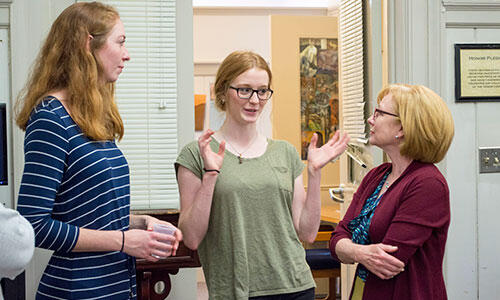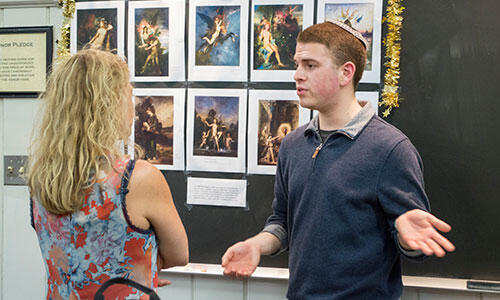McDaniel professor leads national Reacting to the Past Consortium
It’s one thing to read about Socrates, Julius Caesar and Van Gogh, but imagine taking part in the Greek philosopher’s infamous trial for treason, standing among angry senators in the Forum of ancient Rome or defending your radical new art style in late 19th-century Parisian salons. That’s just what Reacting to the Past is — students researching and re-enacting moments in time.

Art History professor Gretchen McKay served as chair of the national Reacting to the Past board.
It’s one thing to read about Socrates, Julius Caesar and Van Gogh, but imagine taking part in the Greek philosopher’s infamous trial for treason, standing among angry senators in the Forum of ancient Rome or defending your radical new art style in late 19th-century Parisian salons. That’s just what Reacting to the Past is — students researching and re-enacting moments in time.
“Because Reacting engages students actively, they learn more deeply,” says Art History professor Gretchen McKay, an early adopter of the active-learning pedagogy originated in the late 1990s by Barnard College History professor Mark Carnes.
McKay, who has been using Reacting in her classrooms for a decade, was recently appointed chair of the national Reacting to the Past consortium board, representing more than 40 member colleges and universities, that currently oversee the curriculum. The dozen or so published, and 200 unpublished, Reacting games are in use by faculty at hundreds of colleges and universities across the nation and around the world, she says.
In an ironic classroom twist, the historic events don’t always turn out as they did in history. Debate and discussion is encouraged, as long as it is built on a solid foundation of knowledge and understanding of the topic. The students who are reliving — and often challenging and changing — the events and outcomes must know their people and topics as well as they know their roommates and weekend plans. And that requires diligent research into not only the event itself but also the culture of the times.
“It becomes an integrative and immersive experience for the students,” says McKay, just back from presenting at a faculty development conference at the American College of Greece in Athens, coincidentally little more than a stone’s throw from city center and site of the Athens game where Socrates was sentenced to drink the poison hemlock more than 2,000 years earlier. “They process the information on a deeper level, and that’s where learning sticks.”
Drew Scott, a junior Sociology major from Brick, N.J., found himself doing a lot of research because the class functioned so well when all the students contributed and participated.
“Every time I walked into class, I was no longer Drew Scott, average Division III football player — I was Marcus Antonius, prestigious Roman,” says Scott. “I was up and actively participating every day in class and loving it!
“I took that class more than six months ago and I still remember so much of what we learned.”
Not all of the games take place in the past. In her History of Western Art class, Caroline Kaufmann was a member of the Greek ministry of culture in a Reacting game focused on the current debate over whether or not the Elgin Marbles, classical Greek sculptures taken from the Parthenon and now on exhibit in the British museum, should be returned to Greece. The junior Psychology major from Hanover, Pa., also played French academic artist Jean Louis Ernest Meissonier in the Art in Paris game in her Romanticism and Impressionism class.
“Reacting forms a welcoming environment for debates and discussions, and it took the information to another level because we got to experience and act out the situations,” says Kaufmann. “It’s hard to forget information when it has actually been learned through an experience.”

Juniors Carrie Kaufmann, a Psychology major from Hanover, Pa., and Tori Simmons, a Political Science and Art History major from Bowie, Md., talk 1880’s art with Robyn Allers, McDaniel president Roger Casey’s wife, during the Art in Paris Reacting to the Past game
Their professor relishes the fact that Reacting, also used by several other McDaniel professors, engages all the students in a class and sparks collaboration among them.
“I did not know that I was going to enjoy Roman Art and Architecture so much,” says Perry Stefanelli, a junior Exercise Science and Physical Education major from Rockville, Md. “It was so refreshing to give my opinion on topics and explain my perception instead of reiterating facts.”
As she looks toward the future of Reacting, McKay will lead the board through a five-year strategic planning process. On the agenda are plans to expand the adoption of the pedagogy, to diversify the disciplines in which it is used and to develop more international games.
The board also plans to identify an assessment vehicle to demonstrate the effectiveness of the pedagogy.
“Basically we need to show that Reacting does what we say it does,” says McKay confidently.

Samuel Blank, a junior French major from Finksburg, Md., discusses Salon de la Rose + Croix during the Paris Exposition in the Art in Paris Reacting to the Past game.
Gretchen McKay, professor and chair of Art and Art History, has been named chair of the national Reacting to the Past Consortium.